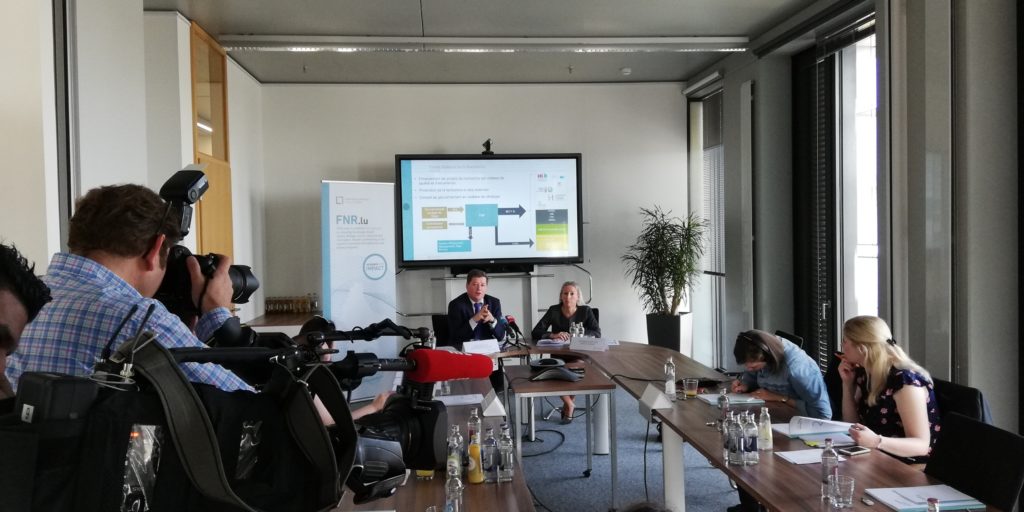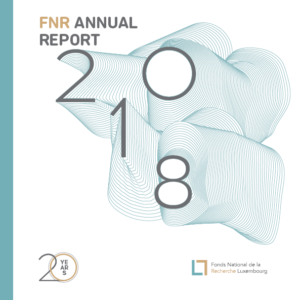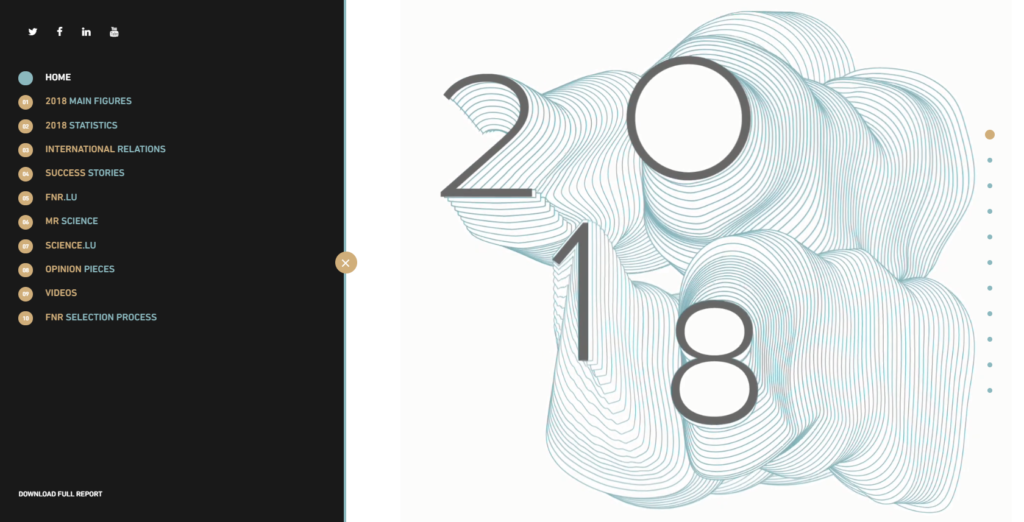Today, Friday, 24 May 2019, Véronique Hoffeld – Chair of the FNR Board – and Marc Schiltz, FNR Secretary General, presented the FNR’s Annual Report for 2018.
The year 2018 was marked by the new multi-year agreement 2018-21 signed between the FNR and the Government, but also by the work of redefining national research priorities for which the FNR was mandated by its supervisory ministry. In 2018, the FNR evaluated 735 proposals submitted under its various instruments and granted funding to 260 research projects. The FNR committed 72.1 MEUR to finance the selected projects.
New performance contract
Under this multi-annual contract, which covers the years 2018 to 2021, the Government allocations have been set at 265.41 MEUR, which the FNR will allocate to public research actors through its competitive funding instruments[1]. The budget allocation allows the FNR to implement its three strategic objectives, which are:
- Strengthening the foundations of public research;
- Contribute to shaping the Luxembourg of tomorrow;
- Promote innovation in public research organisation.
Since its creation 20 years ago in 1999, the FNR has played an essential role in the development of the Luxembourg public research ecosystem, leading the national strategy and maintaining high standards of research excellence and socio-economic impact.
72.1 MEUR for research projects selected according to the criteria of excellence
In 2018, the FNR evaluated 735 proposals submitted in the scope of its various funding instruments. 112 research projects, 89 scientific communication projects – for communication between scientists as well as for exchange with society – as well as 59 AFR PhD and Postdoc grants, were selected for funding[1].
1461 evaluations of international experts were carried out as part of the evaluation and selection process. Of the 735 proposals submitted, 260 were selected for funding, representing a success rate of 36%. To fund all the projects selected in 2018, the FNR has committed 72.1 MEUR.
The three strategic objectives of the FNR
Strengthening the foundations of public research
This first objective is structured around three key elements aimed at strengthening the sustainability of the public research system based on a culture of excellence in the broad sense on the one hand, and at achieving critical mass in key areas on the other, with the ambition of taking scientific leadership.
To this end, the FNR, in close collaboration with the Ministry of Research, worked on the project “Revision of national priorities for public research“, mapping the strengths and weaknesses of the scientific domains funded by the FNR.
In collaboration with an external consultant, the FNR organised two workshops with more than 100 participants, bringing together national stakeholders and international experts. A proposal for the new priorities was developed and sent to the Ministry of Higher Education and Research in spring 2019.
A second key element is attracting talent. These talented people are the source of high scientific production and serve as a vehicle for transferring knowledge from research to society and the economy. Being able to attract the best talent in key areas and support the best researchers in a sustainable way is therefore crucial to building and maintaining an excellent research system. In 2018, for example, the FNR was able to bring Emma Schymanski (UL) and Johannes Meiser (LIH) to Luxembourg via its ATTRACT programme[2].
The third and final key element is the strengthening of international collaboration. By partnering with the best teams in the world, Luxembourg researchers can extend and multiply their impact and have access to expertise in multiple fields that are not available in Luxembourg.
The FNR currently maintains 18 bilateral agreements with funding agencies in 13 countries around the world, and is a partner in 12 international research networks, thus offering Luxembourg-based researchers multiple opportunities for cooperation. Between 2014 and 2018, the FNR supported 279 international projects, representing nearly a quarter of all projects supported during this period.
The FNR is an active member of several international organisations, such as Science Europe and the Global Research Council. As a trusted partner, the FNR is strongly involved in the reflection and definition of best practices in research and quality standards in research funding. This collaboration is also important to increase the visibility of the country’s research system and strengthen mutual trust between partners.
Annual Report 2018 – Highlights pp 52, 53, 54, 58, 58, 60, 61 and 62 and computer graphics pp 64-65
Helping to shape the Luxembourg of tomorrow
By developing priority research themes and aligning them with the country’s strategic development plans, the FNR aims to support innovation in industry, the health as well as the public sector and to support digital and societal transformation. In addition, the FNR wants to anchor science in society by supporting an active exchange between researchers and citizens.
In 2018, the FNR invested around 12.58 MEUR[3] through its innovation programmes, which aim to encourage the transfer of research results into economically viable innovations and public-private partnerships.
The anchoring of science in society takes place at several levels. On the one hand through the “PSP – promoting science to the public” instruments, through which the FNR financed 38 projects in 2018 for a total amount of 1.6 MEUR, and on the other hand through its own “Science in Society” activities.
Among the latter, the 6th edition of the Researchers’ Days should be highlighted: During the two days of the event, nearly 6500 visitors were able to enjoy an intense exchange with researchers. Also worth noting are the more than 323,000 visitors to the www.science.lu website, as well as the many activities of Mr Science[4].
Annual Report 2018 – Highlights pp 51, 55, 56-57
Promoting innovation in public research organisation
In recent years, the FNR has become a research organisation that fully meets the highest standards of quality in its activities, policies and governance[5]. At the national level, it has led a number of initiatives[6] involving all the main actors to consolidate the scientific and research system in Luxembourg.
The FNR has become a leading research agency, fully respected by its partners and whose leading role in the development of national research policies is unanimously recognised. However, the challenges facing the FNR are many.
The major global trends in research, such as digitisation, big data and artificial intelligence, as well as the evolution towards open science, will have a profound impact on the way research is organised and conducted. Similarly, these developments will result in major changes in the way research projects are reviewed and monitored and the results measured in the future.
As a result, the FNR and ten other national research funding bodies, with the support of the European Commission (EC) and the European Research Council (ERC), have launched cOAlition S, a joint initiative to make full and immediate open access to scientific publications a reality by 2020.
The FNR is a strong supporter of OPEN ACCESS. In 2016, the FNR presented its new policy on open access publications from research co-financed by the FNR, considering that the results of public research should be freely accessible, and not hidden behind paywalls.
In December, the FNR signed the DORA declaration, which consists of a series of recommendations to improve the evaluation of scientific production.
As a signatory to the DORA, the FNR fully supports the reporting practices of research evaluation and has updated its own guidelines accordingly. The FNR has always carried out a qualitative evaluation of research proposals, which values a variety of research results.
More information
Selected press coverage
Le bilan 2018 du FNR: 72,1 millions d’euros dans 260 nouveaux projets (Paperjam)
FNR bilan 2018: Markant Partenariater mat Goodyear a mat ArcelorMittal (RTL Lëtzebuerg)
„Enorme Evolution“ (Journal)
Mobilité, logement, des «défis» pour la recherche (L’essentiel)
72 Millionen Euro gingen 2018 in die Forschung (L’essentiel)
[1] For more information, see p. 17 of the 2018 FNR Annual Report
[2] In 2014, the FNR awarded an FNR ATTRACT Fellowship to Prof Dr Dirk Brenner. The corresponding success story can be read on p 58 in the FNR 2018 Annual Report. A video is also available on fnr.lu.
[3] Details available on p 31 (BRIDGES); p 34 (JUMP) and p 36 (Industrial Fellowships).
[4] Portrait on p 76
[5] https://www.fnr.lu/core-selection-procedure-transparent-fair-unbiased-impartial/
[6] E.g. the creation of the Luxembourg Agency for Research Integrity (LARI) ; the development of the National Quality Framework for Doctoral Education


